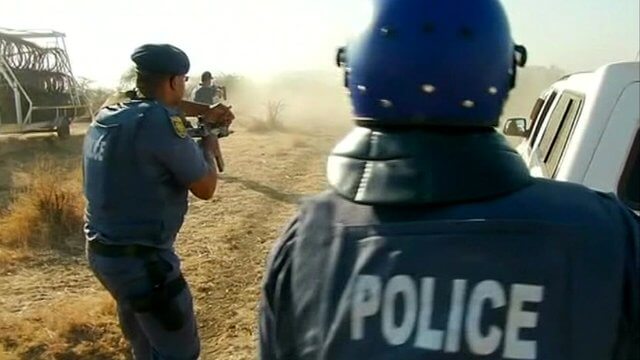 Four days ago, the world pointed the first anniversary of the police massacre that killed 34 platinum miners in the northern town of Marikana, South Africa. The disaster happened last year, on August 16, and also wounded over 75 people.
Four days ago, the world pointed the first anniversary of the police massacre that killed 34 platinum miners in the northern town of Marikana, South Africa. The disaster happened last year, on August 16, and also wounded over 75 people.
“The attack reminded many people of the massacres inflicted by white supremacist forces during the apartheid era, except this time it was black people who gave the order to kill and black people who pulled the triggers”, writes David Whitehouse, a member of the International Socialist Organization, in a recent opinion article published on the blog Socialist Worker.
The massacre was a historical moment, one of the biggest happenings in South Africa’s recent history, and triggered a series of events. But the truth is that it also helped make some changes in the country’s political system. According to David Whitehouse:
Nevertheless, it is the mineworkers’ own actions that may exert the most lasting impact. The strike was not authorized by the local branch of the National Union of Mineworkers (NUM) – which made the action, in trade-union terms, a wildcat -thus demonstrating that the miners were willing to act on their own behalf. Maybe even more important, the miners kept up the strike without NUM support after the massacre and won a 22 percent wage increase.
The victory touched off a wave of wildcat strikes in the “platinum belt” that eventually spread to the gold mines. By October, the strikes had involved more than 75,000 miners–15 percent of the workforce in an industry that accounts for 6 percent of Africa’s gross domestic product and 20 percent of its exports.
The strike wave also marked a crisis for the NUM. Before the strikes, the union was the largest member of the Congress of South African Trade Unions (COSATU), which is a partner of the ANC [African National Congress] and a leading force in turning out votes for the ruling party. Since the Marikana massacre, however, the NUM has lost 40,000 to 45,000 members–more than 15 percent of the total.
In the meantime, the Association of Mineworkers and Construction Union (AMCU) supported the strikes that followed, becoming the dominant union at the world’s top three platinum-producing companies. The workers now keep fighting for their rights, but new tragedies have happened, involving the death of miners.
However, this new wave of strikes and events promoted by self-organized workers have had an impact beyond the union movement, as many thousands have been inspired to consider political alternatives outside the African National Congress.
One of the alternatives might be the new option created by Julius Malema. Probably inspired by the attack that happened a year ago, the former ANC Youth League president formed a new political party called Economic Freedom Fighters (EFF), which will contest the national elections scheduled for next year.
